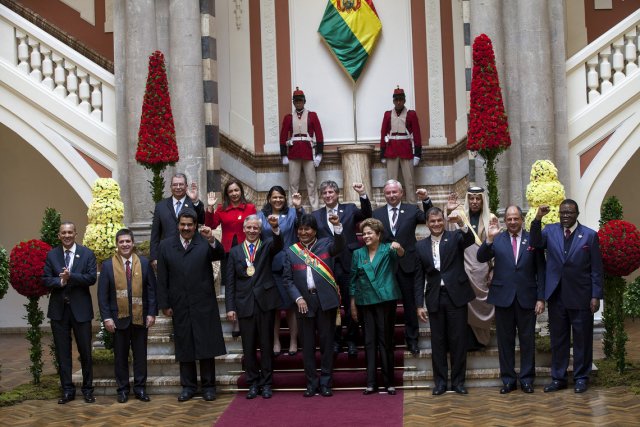
Out of dictatorships and authoritarian regimes that have marked them deeply between the 1960s and the 1980s, a large number of South American countries have seen the emergence of democratization processes based on policies often described as right-wing. Defined by a strong disengagement from the state, the experiments conducted by Carlos Menem in Argentina, Alberto Fujimori in Peru, or successively by Fernando Collor de Mello and Fernando Henrique Cardoso in Brazil, were characterized by their neoliberal influence.
This economic-political model ran out of steam at the end of the 1990s, mainly because of its structural limitations, but also because of the deepening and broadening of anti-neoliberal criticism. The sub-continent sees the arrival in power of new political elites, mostly from social movements born in the previous period. Often marked by a neo-developmentalist orientation, these political agents will give back to the State a central role in the economic organization while distinguishing themselves from the previous governments by their social policies known as "conditional monetary transfers" [1].
In such a context, to speak of a "left cycle" for countries like Brazil, Venezuela, Bolivia, Argentina or Chile, Paraguay and Ecuador, then became a commonplace to characterize the political life of the region. The new governments then designated alternative paths for economic, social and environmental development, this being the result of a long process of struggles, the creation of new modes of organization, or even structural changes within the political field.
However, from 2010, in a context of retraction of the global economy, these projects seem threatened by their internal limits. The weaknesses of the economic process as it was built were deepened by an economic and financial crisis that intensified on the subcontinent from 2012. In this context, defined by political, economic and social instability, this "left cycle" seems to be coming to an end - or at least in the face of a blockade - with the advancement of the right wings within these left-wing governments.
In this dossier, we will try to analyze the specific dynamics of this ongoing process in the subcontinent. To do so, we will rely on the analysis of the different national frameworks while not neglecting the transnational character of such a political process. Beyond the different national realities, the articles of this dossier [2] will address the economic, social and political mechanisms in action during this period from the late 1990s to half of the 2010 decade.
Table of content :
- Amérique du Sud : La fin d’un cycle ?
- Brève histoire contemporaine des mouvements sociaux en Amérique latine
- Cartographie politique de l’Amérique du Sud : le basculement des années 2010
- L’Argentine et le souffle du kirchnerisme
- De la désobéissance civile à la révolte dans le mouvement étudiant chilien
- Réécrire l’histoire des morts : les Mères de Mai et leur lutte pour la justice dans les banlieues brésiliennes
- Progressisme extractiviste en Equateur : changement ou continuité du (même) paradigme ?
- La situation des peuples autochtones dans la Bolivie d’Evo Morales
- En Amérique latine : un « journalisme de guerre » contre les gouvernements progressistes ?
- Brésil : éclipse des gauches, essor des droites
- Venezuela : le gouvernement impuissant face aux offensives de la droite et l’effondrement économique
- Où va l’Amérique du Sud ?



